Modern rustic kitchen ideas – 11 ways to create functional yet characterful spaces
Create characterful, inviting spaces that perfectly balance old and new with these beautiful modern rustic kitchen ideas

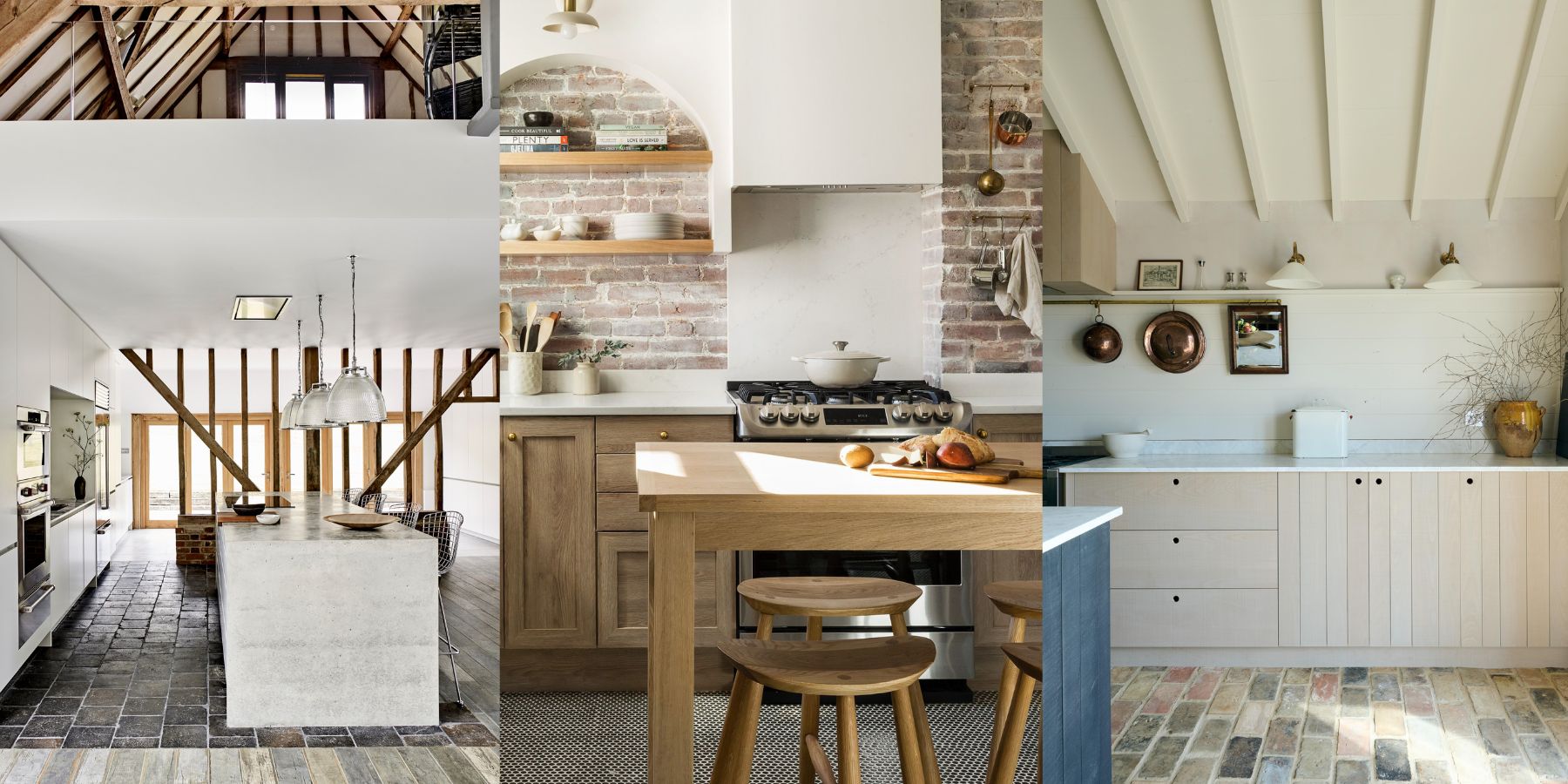
- 1. Combine exposed brick with sleek lines
- 2. Choose contemporary wood cabinets
- 3. Celebrate natural materials
- 4. Mix historic architectural features with modern materials
- 5. Embrace sustainable style with salvaged wood cabinets
- 6. Mix bespoke cabinets with antique furniture
- 7. Choose rustic yet practical materials
- 8. Introduce texture with handmade tiles
- 9. Pair warm wood with utilitarian accessories
- 10. Add subtle texture with lime plaster walls
- 11. Introduce softness with fabrics
Modern rustic kitchens are all about balance. The spaces are characterized by a wealth of aged, exposed surfaces and beautiful architectural features combined with sleek lines, yet they have all the functionality of a modern kitchen.
An abundance of exposed wood and stone are juxtaposed with more modern materials like polished concrete, while sleek fitted cabinetry is often teamed with relaxed freestanding pieces and antique furniture. Whether you’re looking to create a kitchen from scratch or bring some modern rustic kitchen ideas into an existing space, we've gathered an array of stylish schemes and handy expert tips to help inspire your project.
Modern rustic kitchen ideas
The beauty of modern rustic kitchens is that there are no strict design rules when it comes to designing a kitchen, the options are endless. Its mix of old and new makes modern rustic a versatile look perfect for country and city homes. The style puts patina and texture at the forefront and lets architectural features take the lead in the design.
The key to a successful scheme is to strike the right balance of old and new. Too many rustic surfaces and aged pieces of furniture and the space can feel dated; alternatively, go too minimal, and a modern kitchen can sometimes feel cold and clinical. It's about drawing on rustic kitchen ideas but giving them a modern twist.
‘The appeal lies in the balance between modern sophistication and the warmth of rustic charm,’ says interior designer Julia Dempster. ‘It’s about creating a cozy yet stylish environment that feels both timeless and contemporary.’
1. Combine exposed brick with sleek lines
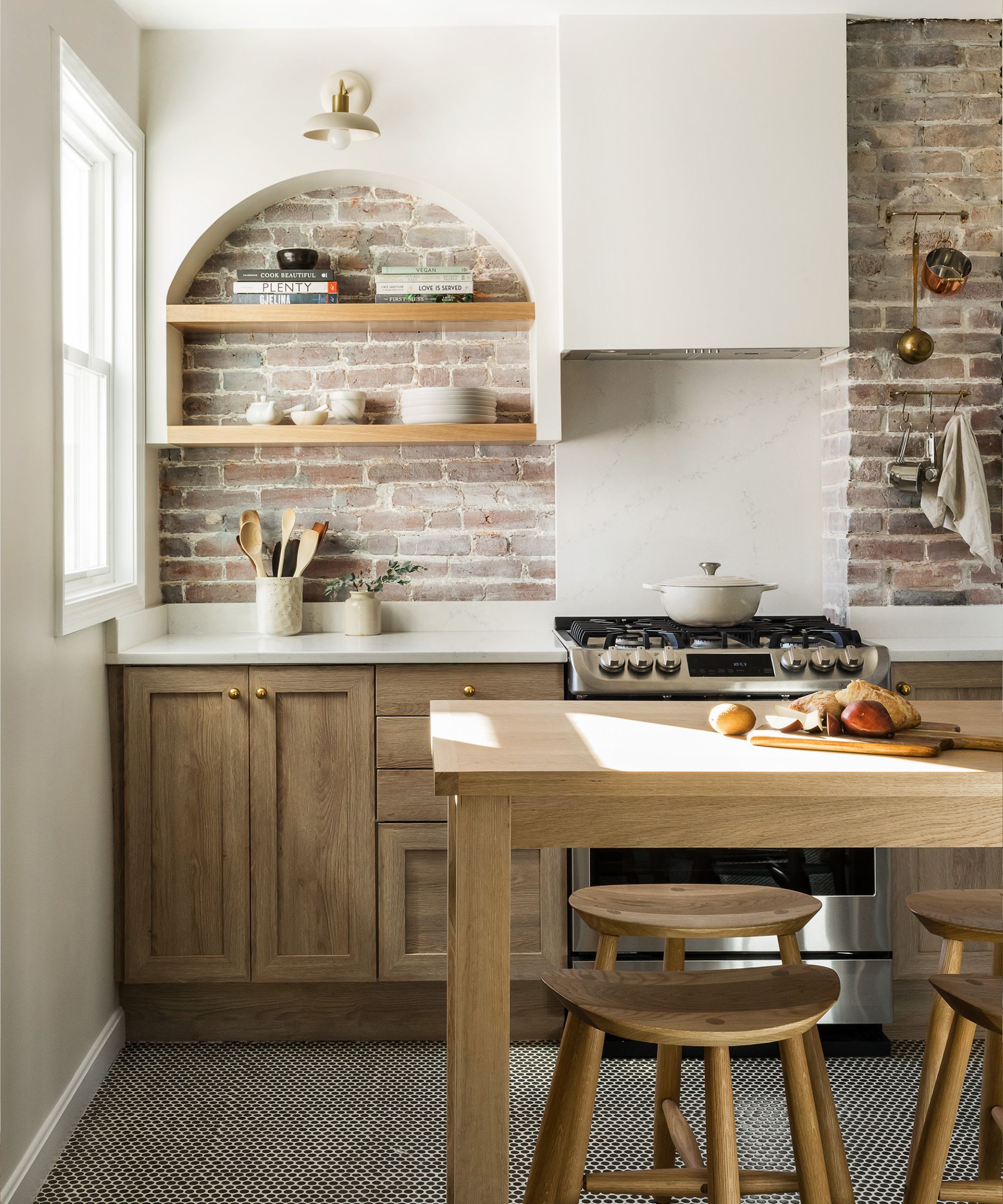
Interior designer Shannon Tate-Giordano, founder of Shannon Tate Interiors, has paired beautiful natural timber and industrial brick with sleek lines to create a perfectly balanced modern rustic look in this Boston home.
‘I think the wood tones and brick lend themselves to what one would call a rustic palette, yet the clean lines of the hood, and the arched shelves, as well as the lighting, all add a refined energy that leans more femme-modern.' says Shannon Tate-Giordano. 'This kitchen feels like you could look out the window and see many different European Countryside settings, yet you are in Cambridge, Boston.’
Design expertise in your inbox – from inspiring decorating ideas and beautiful celebrity homes to practical gardening advice and shopping round-ups.
2. Choose contemporary wood cabinets
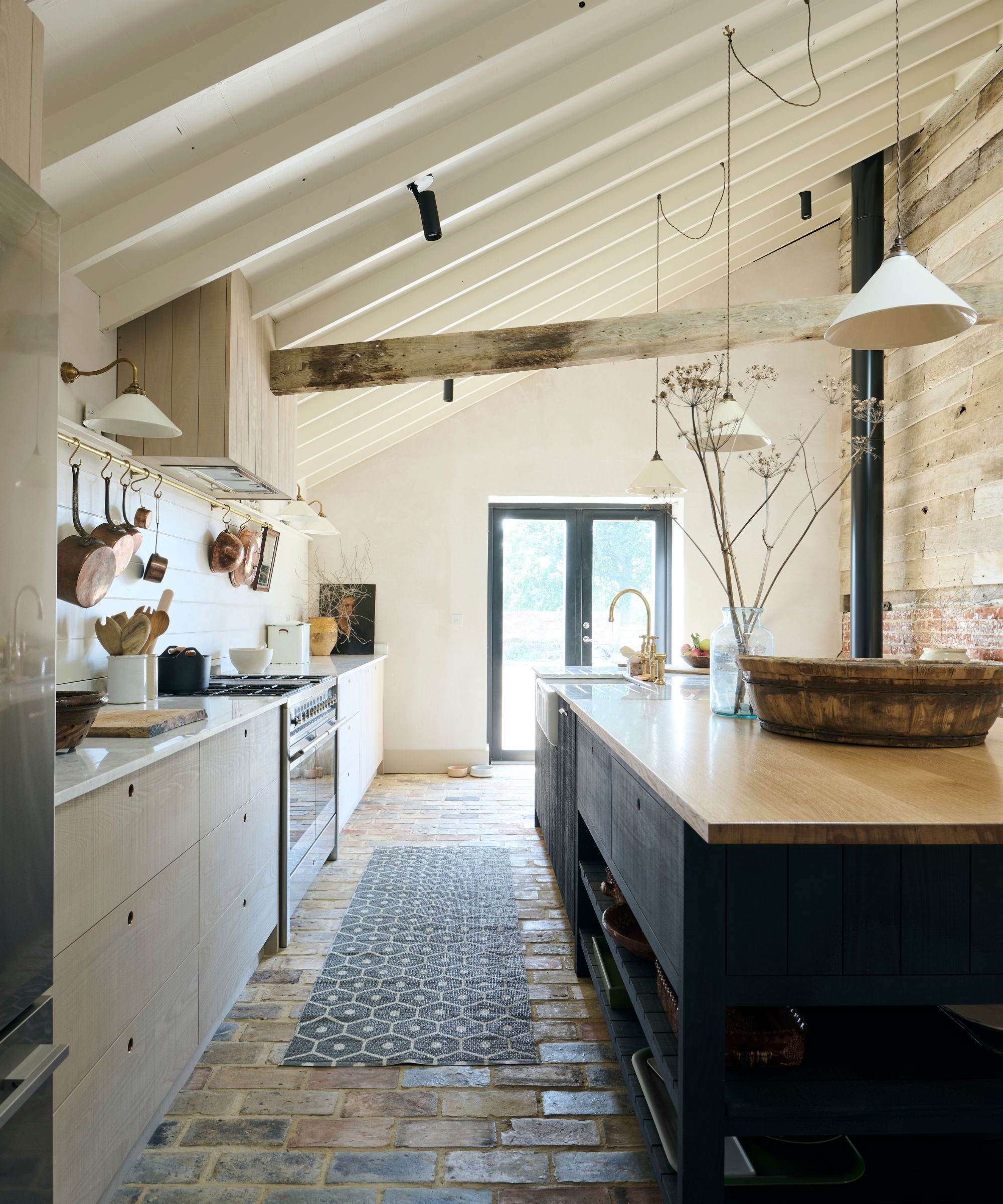
With its brick floor, wooden ceiling beams and sleek wood kitchen cabinets, this stylish kitchen, set in an ancient barn in Suffolk, England, has all the hallmarks of a modern rustic space. Sleek yet characterful, the handcrafted, modern rustic deVOL kitchen cabinets beautifully complement the historic architecture and feature doors constructed from beech planks which have been gently stained to allow the grain to shine through. ‘We have come to think of the look as "urban rustic"; it brings a little bit of woodland into the city, with some style,’ says Helen Parker, creative director at deVOL.
Of this Suffolk Dairy kitchen she says: ‘It’s a simple layout; a huge kitchen island, a clean straight cabinet run with a classic Smeg range cooker and no wall cupboards, which allows the beauty of the ancient structure to shine through without hampering a modern lifestyle.’ Great for a small modern rustic kitchen space and letting your modern rustic kitchen wall decor ideas run wild.
3. Celebrate natural materials
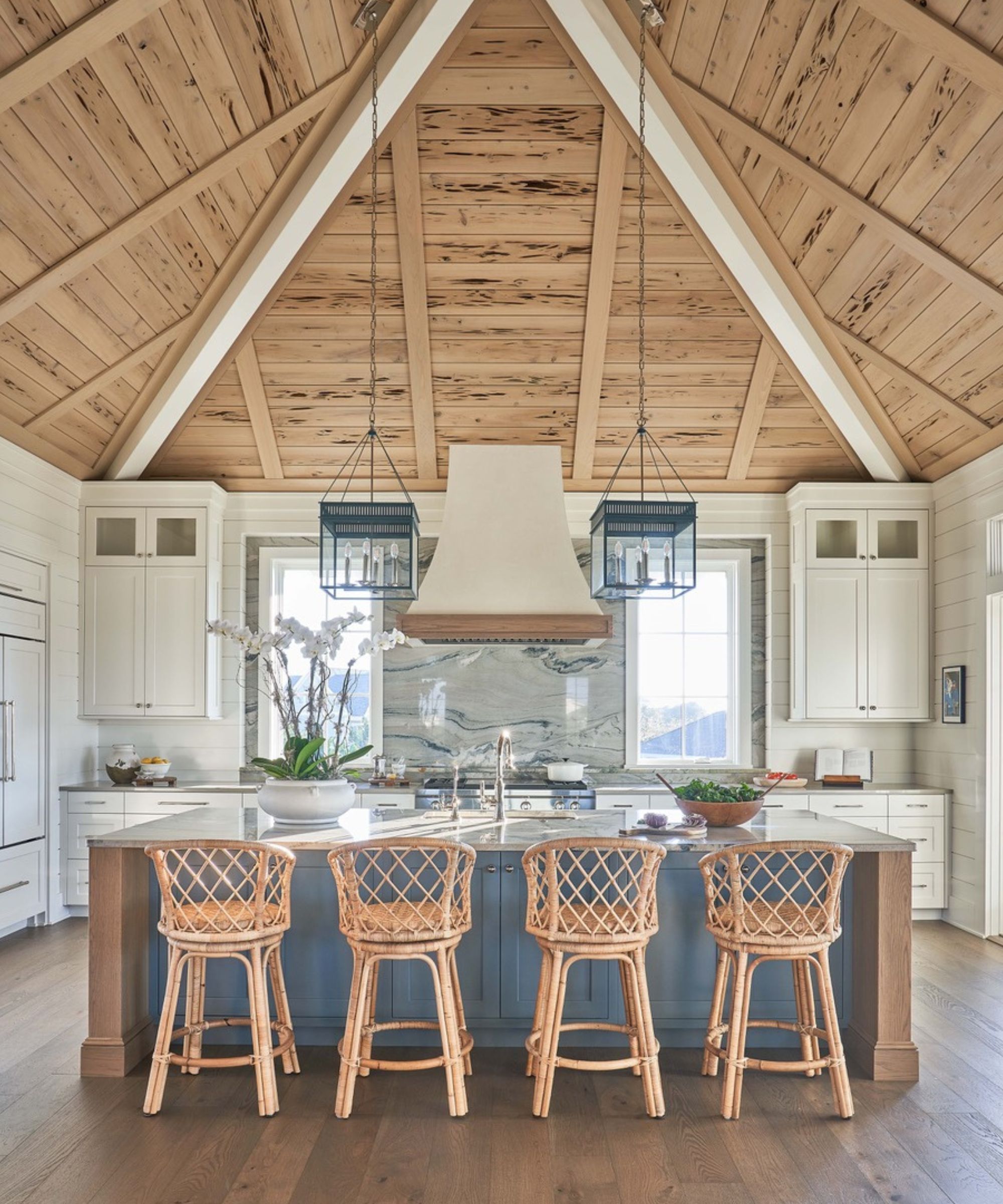
You don’t need a historic home to create a kitchen with rustic character. In this newly-built waterfront property, Herlong Architecture and Interiors introduced a wealth of timber and stone into the kitchen to create a welcoming space full of patina that pays homage to its coastal setting.
‘The initial interior design inspiration was drawn from the clients' love of natural stone and appreciation for natural materials. I wanted to marry their love for natural stone in a way that was both functional and beautiful, and so the stones could act like their own works of art,’ explains Cintra Sedalik, designer at Herlong Architecture and Interiors.
‘The kitchen backsplash is a slab of Maya Quartzite from Brazil which abstractly resembles ocean waves. This slab informed the touches of deep blues and greens found in the fabrics and light fixtures of the great room and scullery. Warmly finished Pecky Cypress is used throughout the home to bring in a coastal wood that helps ground the voluminous spaces with a more cozy feel.’
4. Mix historic architectural features with modern materials
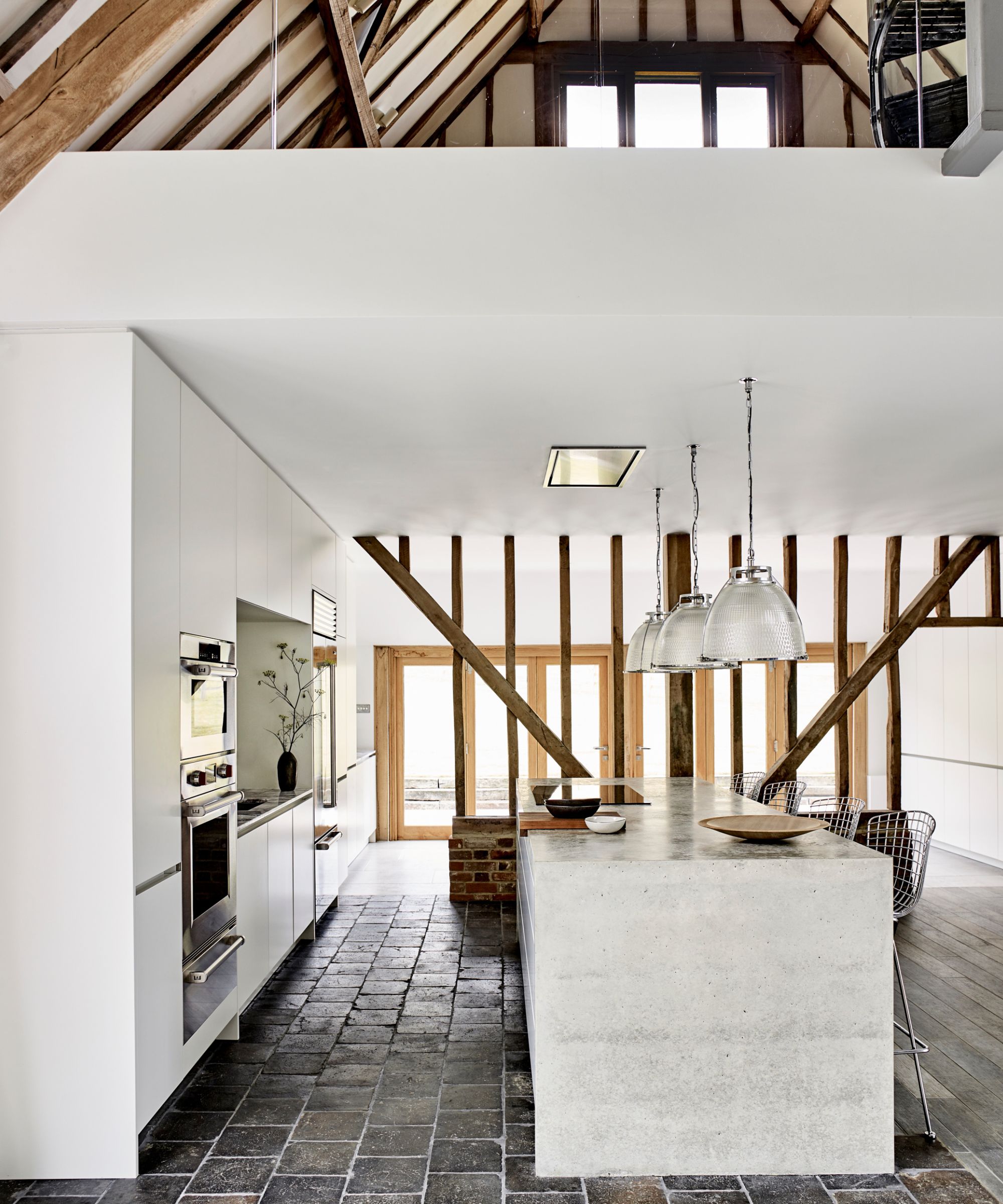
In this breathtaking kitchen, the designers at Roundhouse paid homage to the architecture by creating a stark contrast between old and new, adding a sleek white kitchen in a room within a room. While the handleless white cabinets, polished concrete and glossy marble all contrast with the history of the property, this only serves to highlight the architectural features without distracting from them.
‘The aim here was for a design that was clean-lined and pared-back so that it didn't clash with the stunning architecture. The key to success was a palette of honest materials layered to create subtle interest,’ says Sam Hart, senior designer at Roundhouse.
‘A statement kitchen island is placed center stage in the new scheme and is encased in concrete for extra wow factor. Tactile, smooth and cold to the touch, concrete can make a striking and durable worktop material.’
5. Embrace sustainable style with salvaged wood cabinets
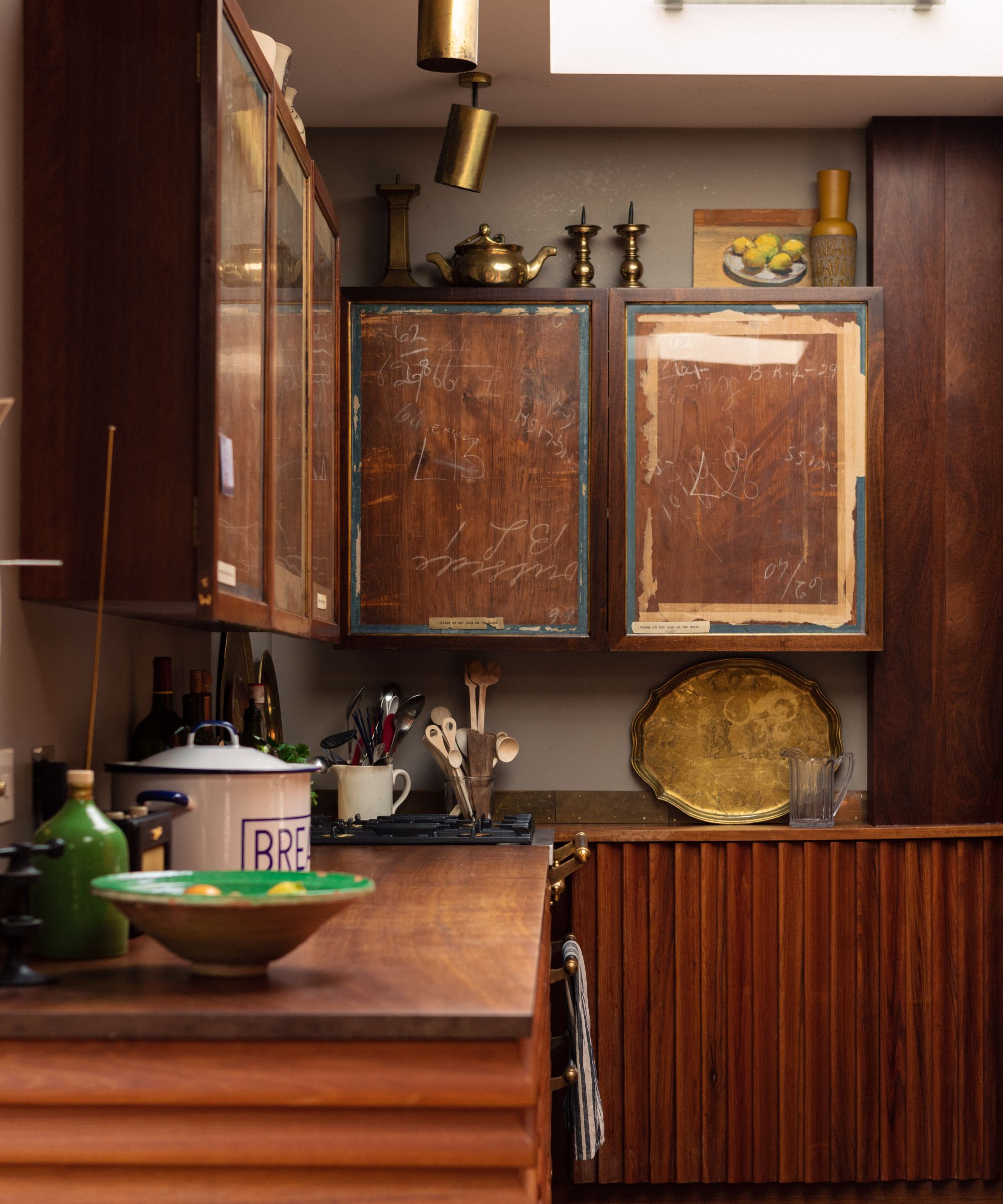
Brimming with warmth and unique character, this kitchen by Retrouvius combines an array of reclaimed timbers ingeniously redesigned to form a functional kitchen.
‘The kitchen cabinet doors are made from salvaged frames which have been reversed so you see the textured patina, while the doors are made from salvaged hardwood architraves; the ridged structure doubles as door handles,’ say the design team at Retrouvius.
The kitchen countertops are salvaged Iroko wood from municipal buildings and the salvaged brass kick plates bring beautiful warmth and can easily be unscrewed and replaced if required.
6. Mix bespoke cabinets with antique furniture
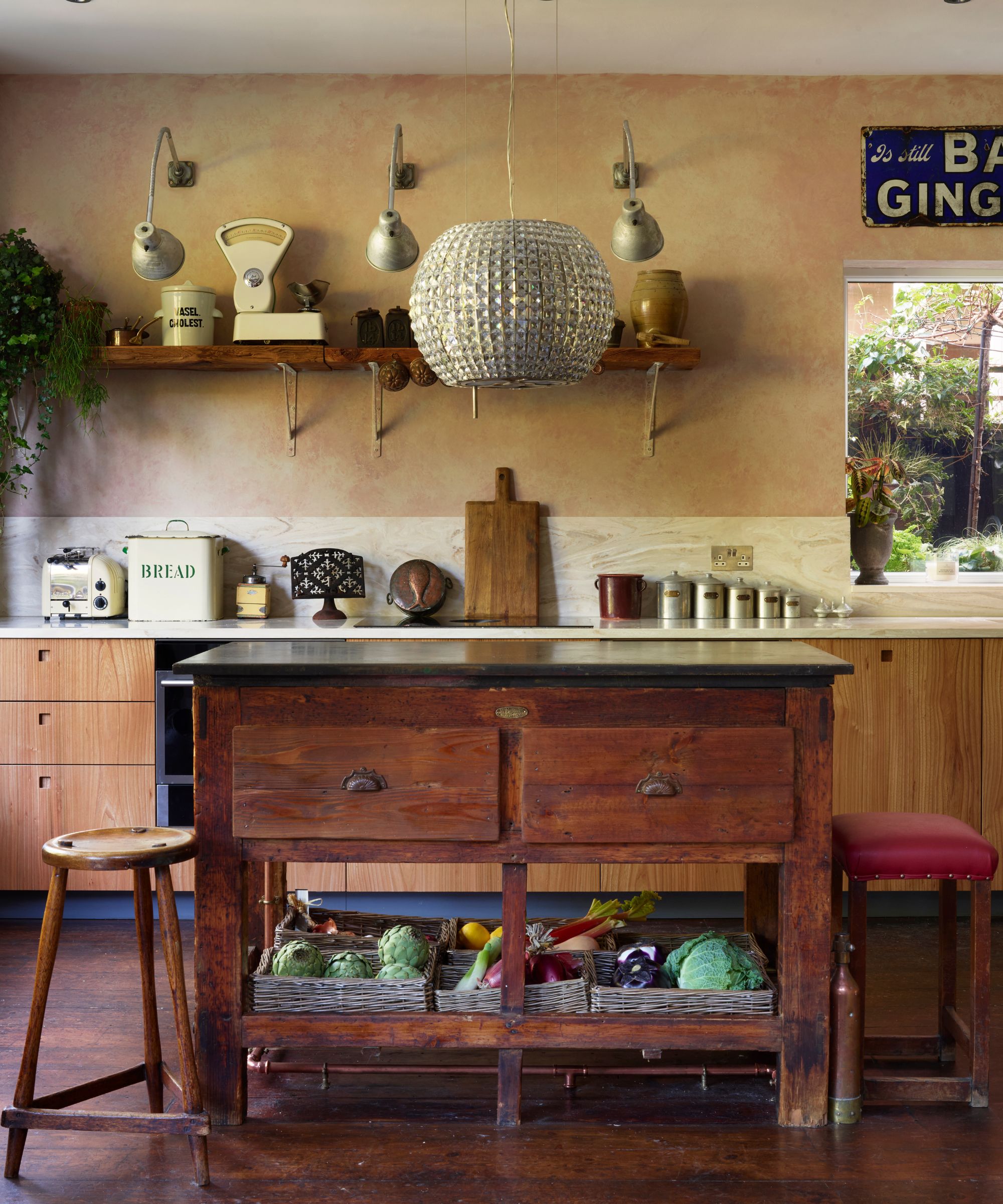
Opting for a mix of modern, bespoke cabinetry and antique freestanding kitchen pieces is a wonderful way to create a unique space full of character. Not only do vintage kitchen pieces such as dressers and butchers' blocks have a beautiful patina from years of wear, they can also be easily moved should you want your kitchen reconfigured.
‘This kitchen is the vision of a creative London couple who have spent years collecting antiques, curiosities and other furniture for their Edwardian family home,’ says Leila Touwen, co-founder of Pluck Kitchens. ‘The space is about the layers of old and new, the combination of antique and modern, it feels like a room rich with stories and history, but it is not stuck in the past.’
‘Pluck’s design includes an L-shaped layout that works with the shape and flow of the room. The cupboard doors are Elm and Brockwell Moss cabinetry, the different materials add to the sense this is not a traditional fitted kitchen, something that was important for our clients.’
7. Choose rustic yet practical materials
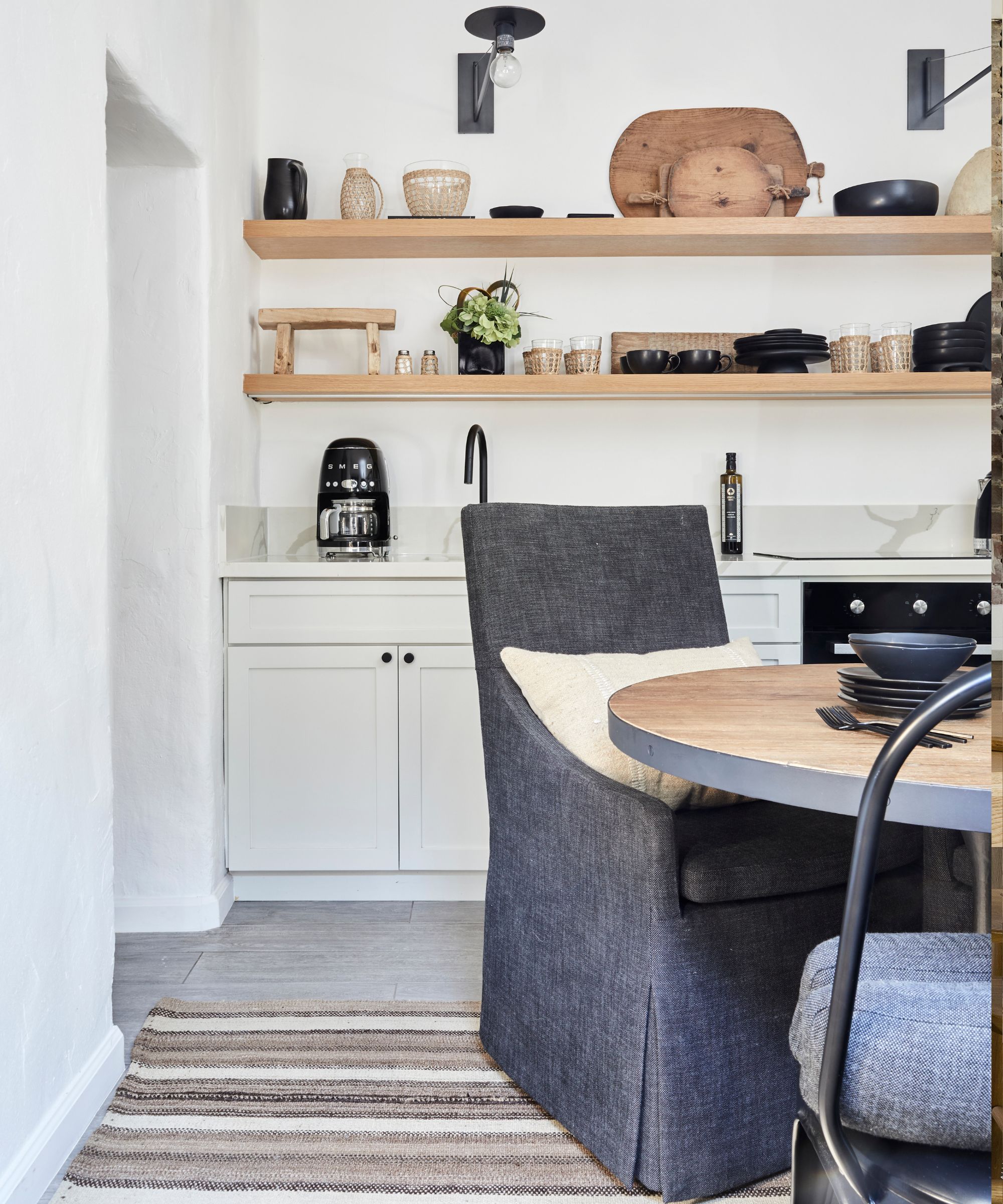
Interior designer Julia Dempster is renowned for her use of varied rustic textures and has continued the theme throughout this guesthouse kitchen. Fabrics like relaxed organic linens and old grain sacks are perfect for capturing the rustic look, however, in kitchens, they can be impractical as they can pick up smells and easily stain.
Combining style with functionality, here Julia Dempster chose seating in a wipeable Perennials Performance Textured Linen Weave which brings lovely texture without the worry of spills or stains.
‘The Restoration Hardware slip-covered linen high-back dining chairs were on castors and doubled as a lounge chair, hence this model was chosen. I wanted them to be practical and resistant to stains. With outdoor grade upholstery, they withstand more wear and having loose covers means they can be washed easily. I decided to go dark as I knew they would have a great deal of use by guests.'
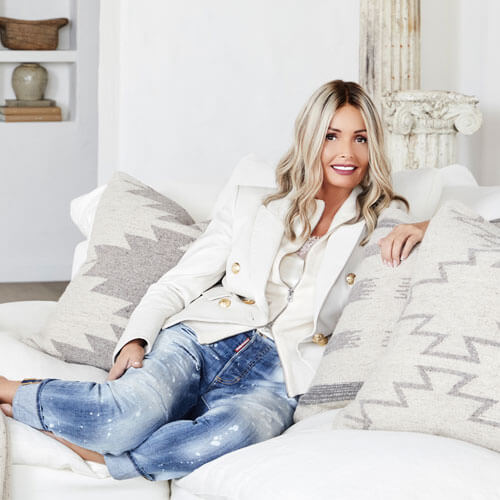
The renowned British interior designer Julia Dempster has worked on hundreds of projects worldwide from luxury hotels to royal residences. A master at working with neutrals and textural materials to create a look of understated luxury, Julia's cool, sophisticated interiors are guaranteed to inspire.
8. Introduce texture with handmade tiles
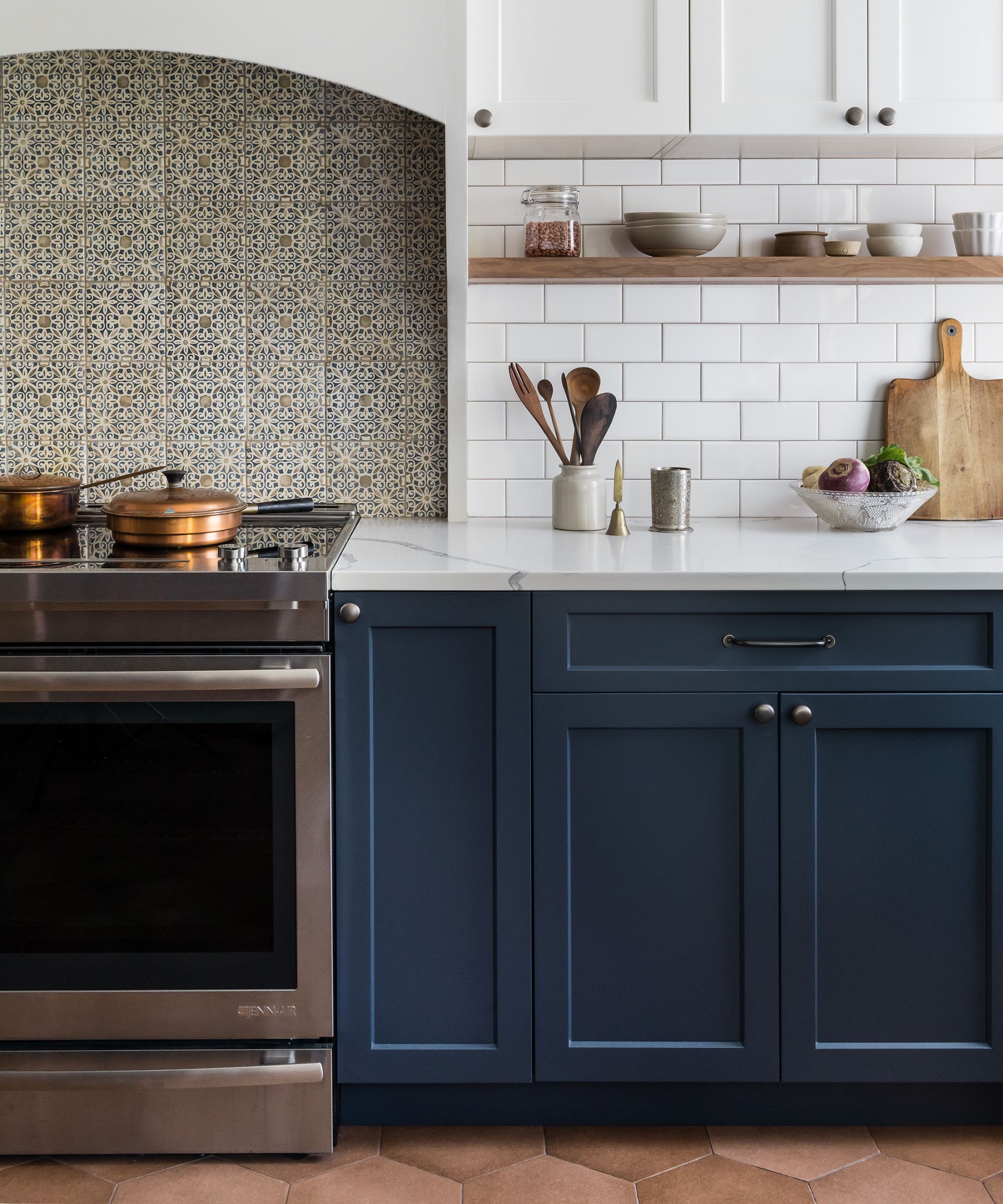
Mixing an assortment of kitchen tiles is an easy way to introduce pattern and texture into a timeless kitchen. Here interior designer Shannon Tate-Giordano used a combination of terracotta floor tiles and patterned wall tiles to bring rustic Mediterranean charm to this classic Shaker-style kitchen.
'We chose terracotta because we wanted this kitchen to be classic and timeless,' explains Shannon Tate-Giordano, founder of Shannon Tate Interiors. 'The terracotta floors paired with our hand-made, hand-painted backsplash tiles give it a natural rustic feel because each one is slightly different, (as comes with the human touch) which gives a feeling of soul and approachability.'
Wooden open kitchen shelving and copper pans add further warmth to the space, bringing balance to the cool blue cabinets and industrial subway kitchen wall tiles.
9. Pair warm wood with utilitarian accessories
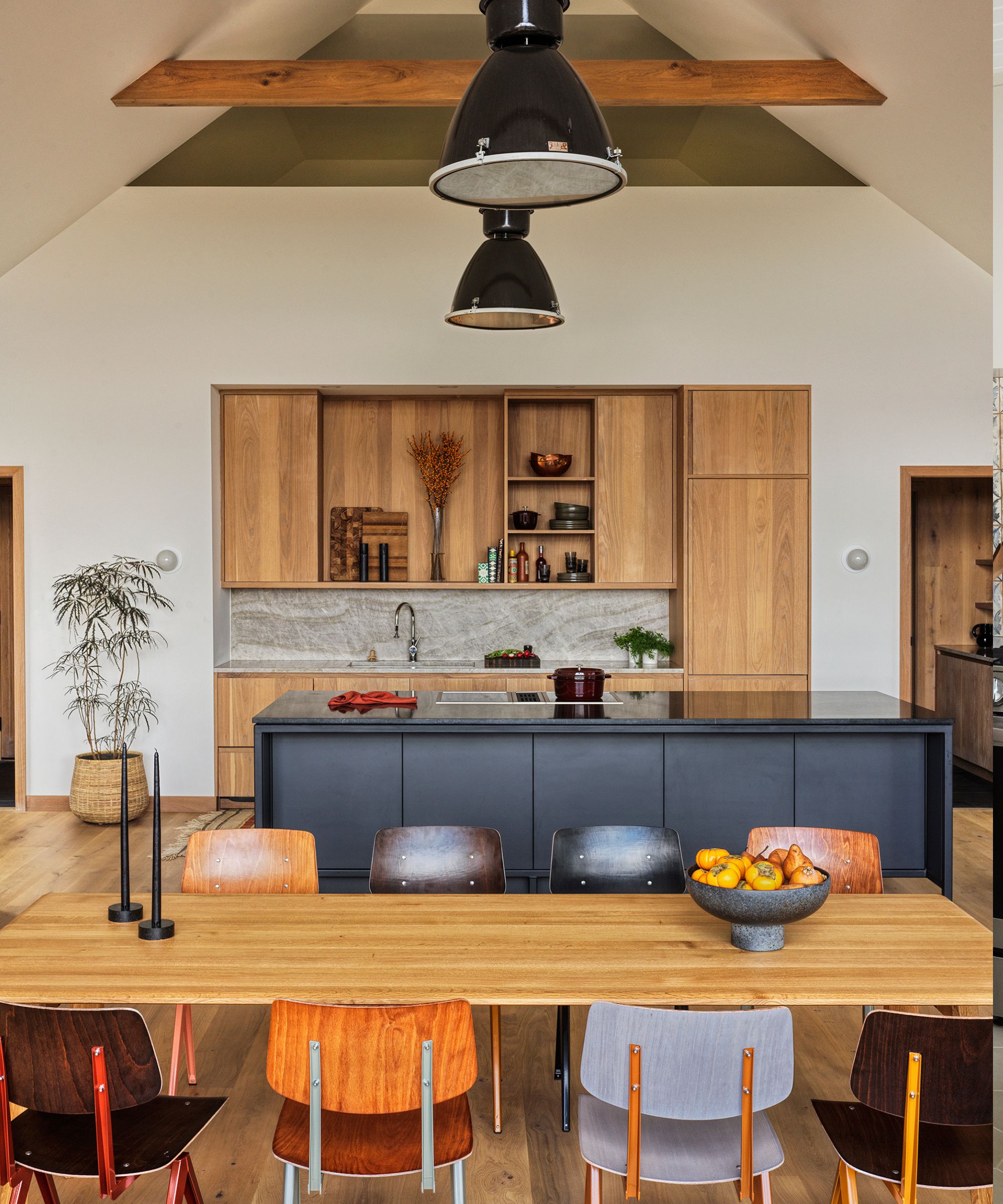
With its sleek wooden cabinets paired with playful industrial kitchen lighting and mid-century-style chairs, this modern rustic kitchen by Elizabeth Roberts Architects is both sophisticated yet warm and characterful.
‘Much of the interior of the house is clad in wood (tongue and groove paneling) to bring the warm feeling of a ski cabin. The wood kitchen is finished to match that wood paneling,’ says Robby Rathmann-Noonan, director of interiors at Elizabeth Roberts Architects. ‘The island is clad in darker finishes and creates a nice contrast with the white and wood walls.'
‘We altered the industrial pendant lights to make them "perfect" for this project including having the diffuser frosted so that they would work a bit better when seen from underneath. We also had them rewired so they hung on a fabric cord (rather than in their original industrial style with a hook, wire, and chain).’
‘The dining chairs aren't vintage but are newly made versions of the vintage "Revolt" chair available at 1stDibs that come in a wide range of finishes. We selected them because they came in a range of woods and colors and could be mixed well with all the wood in the room.’
10. Add subtle texture with lime plaster walls
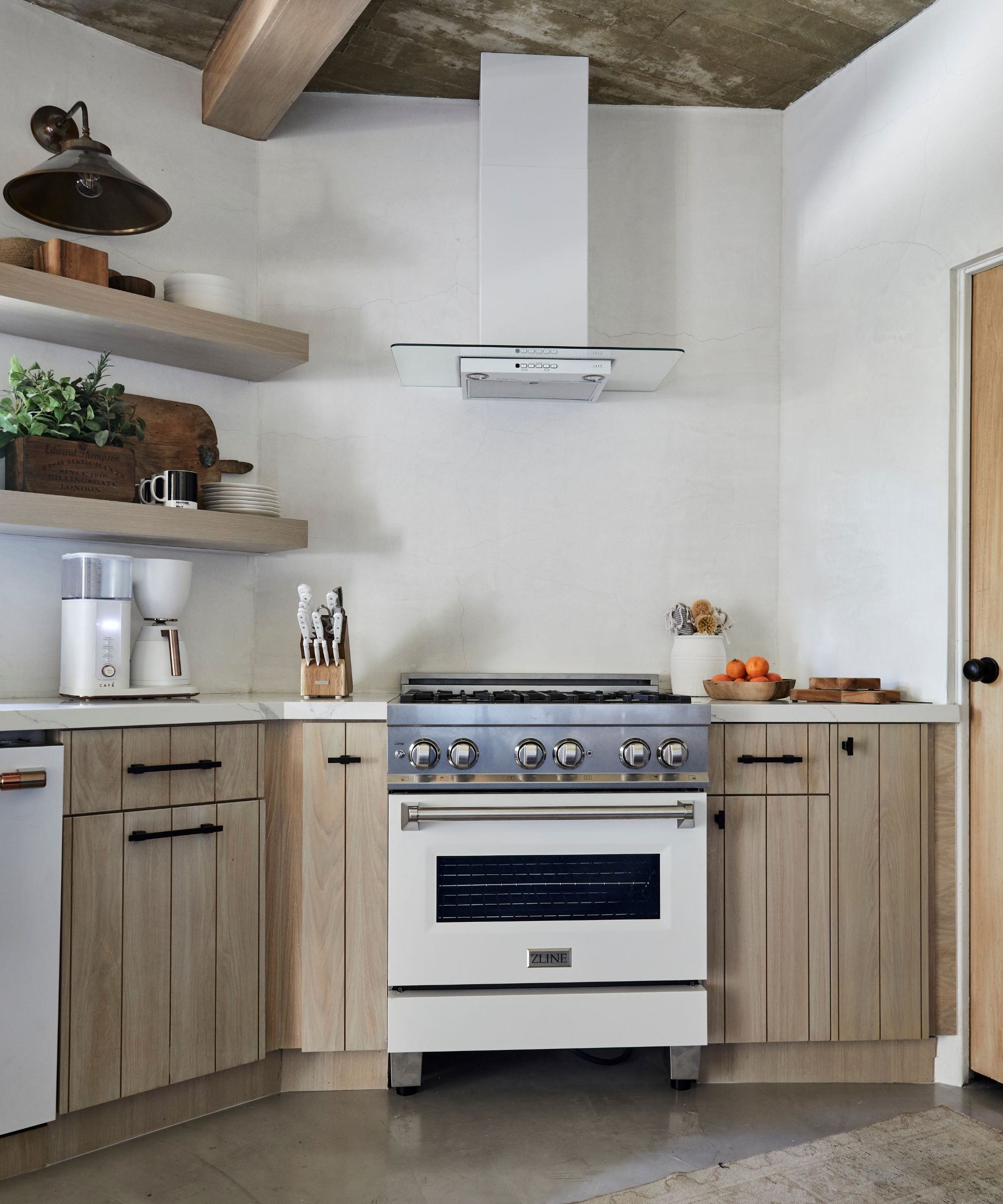
Renowned for her love of rustic textures and patinas, Julia Dempster combined lime plaster walls, wood cabinet doors and a polished concrete floor to bring layers of character to this modern neutral kitchen.
‘This was an extremely dark room; I stripped ninety years of layered wallpaper and finishes back to the bare concrete and exposed the original concrete ceiling and oak beams,' explains the interior designer.
'I wanted to bring warmth but keep it light, so I added subtle texture with a lime plaster. Cement, polished concrete surfaces and industrial elements are softened with an eclectic mix of warm wood textures and copper lighting from Amber Shoppe.'
11. Introduce softness with fabrics
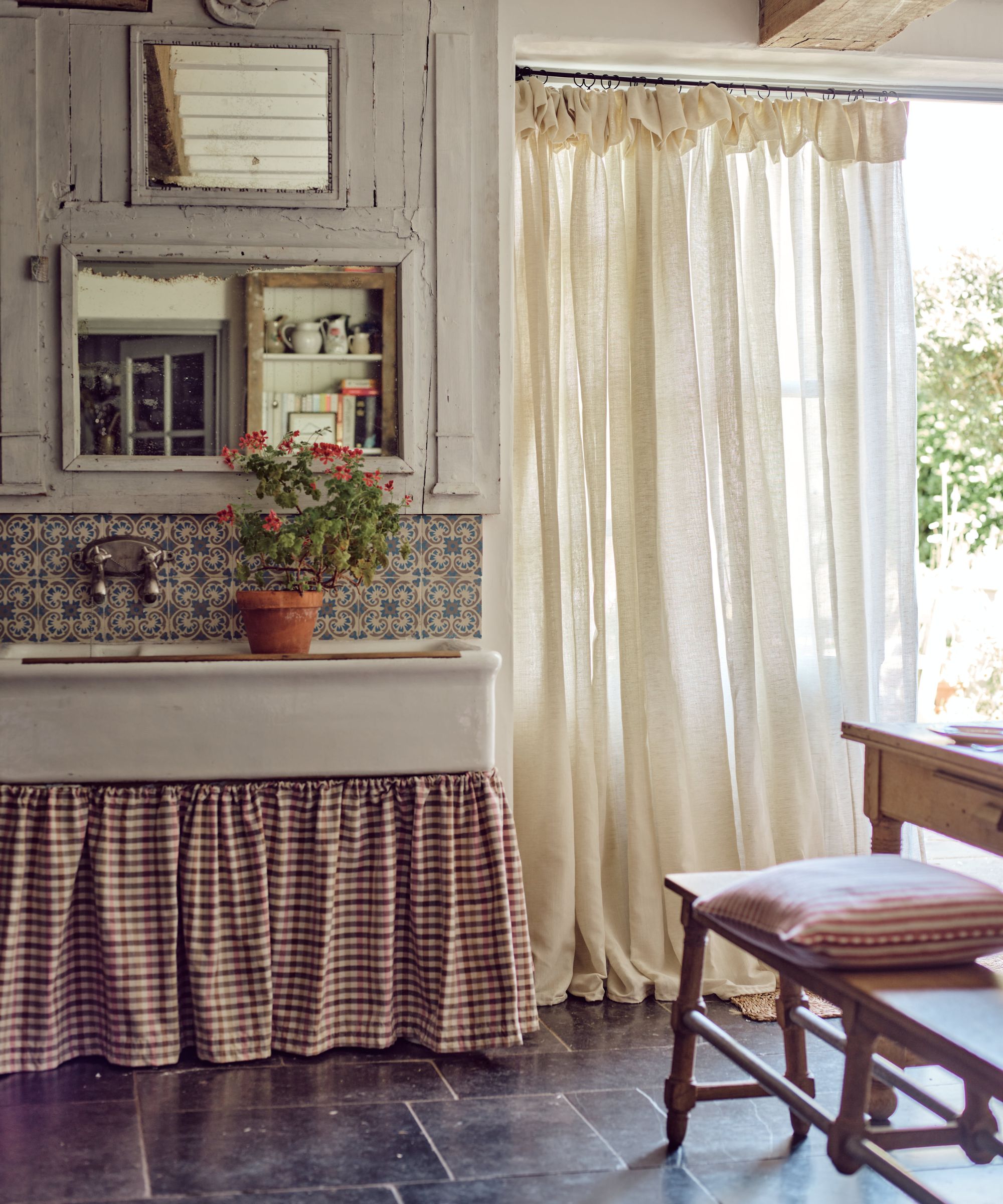
With their wealth of exposed surfaces, sometimes modern rustic kitchens can benefit from the introduction of fabrics to soften the space, plus, textiles can help deaden sound for a more relaxed atmosphere. Used under countertops instead of cabinets, fabric valance ideas for kitchens can also make a quick and affordable way to conceal modern appliances or kitchen clutter.
Here a ceramic reclaimed sink, together with a sink curtain in Tori Murphy's Dresser Check cotton fabric and full-length kitchen curtains in a sheer linen mix, all contribute to a rustic French country kitchen feel.
What is a modern rustic kitchen?
Modern rustic kitchens are characterized by their mix of contemporary design and wealth of natural materials and textured patinas. A versatile kitchen style that can complement both historic and new properties, modern rustic combines up-to-date functionality and appliances with aged and characterful surfaces for a perfect balance of practicality and comfort. Any architectural features, whether country-style or industrial are preserved and showcased within the design rather than concealed.
'Key elements include incorporating materials like wood, stone, and metals to bring in a sense of nature and authenticity,' explains interior designer Julia Dempster.
'I tend to embrace a palette of neutral tones, such as earthy browns, grays, and whites, to create a calm and warm atmosphere. Utilizing sleek and simple lines in furniture and architecture while maintaining a sense of simplicity means rustic elements stand out more.'
How do you make a modern kitchen look rustic?
Introducing furnishings, accessories and window treatments in textural, natural materials is a great way to add rustic charm to a modern kitchen and will help the space feel more lived-in and characterful.
When creating a modern rustic kitchen, 'so much of it comes down to materials used,' says fabric designer Tori Murphy. 'Natural materials that speak have a sense of character and imperfections are allowed to shine through, and layers of fabrics – cottons, wools, linens all softened with age will add to the look.'
'Gentle hues in paint colours, timber, and stone act as the perfect backdrop for personal possessions that are gathered considerately over time,' adds Tori Murphy.
Decorating shelves in kitchens with antique pieces and introducing natural materials through accessories is an easy way to bring instant character.
'I love using open shelves in kitchens as they can add drama but offer a practical solution as everything is at hand and can be viewed easily,' says Julia Dempster. 'Do not have all the items on a longer shelf the same height. Not only should you contrast textures and materials, but height too. I would recommend using a series of elements as they add more impact.'
You can also try switching light fittings and hardware for vintage-style designs in warm burnished brass. 'Antique lighting above an island is a fun way to bring in patina. I love finding one-of-a-kind lighting fixtures and having them rewired to use above an island,' says interior designer Allison Babcock.

Pippa is a contributor to Homes & Gardens. A graduate of Art History and formerly Style Editor at Period Living, she is passionate about architecture, creating decorating content, interior styling and writing about craft and historic homes. She enjoys searching out beautiful images and the latest trends to share with the Homes & Gardens audience. A keen gardener, when she’s not writing, you’ll find her growing flowers on her yard for styling projects.